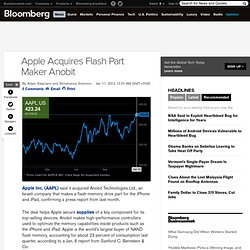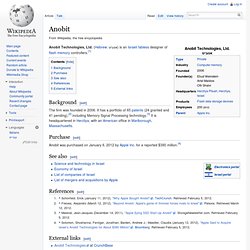

Apple Acquires Flash Part Maker Anobit. Apple Inc.

(AAPL) said it acquired Anobit Technologies Ltd., an Israeli company that makes a flash-memory drive part for the iPhone and iPad, confirming a press report from last month. The deal helps Apple secure supplies of a key component for its top-selling devices. Anobit makes high-performance controllers used to optimize the memory capabilities inside products such as the iPhone and iPad. Apple is the world’s largest buyer of NAND flash memory, accounting for about 23 percent of consumption last quarter, according to a Jan. 6 report from Sanford C. Bernstein & Co. Steve Dowling, a spokesman for Cupertino, California-based Apple, said today that the purchase had been made, while declining to elaborate.
“Apple buys smaller technology companies from time to time and we generally do not discuss our purpose or plans,” Dowling said in a telephone interview. The Anobit deal, whose cost Apple wouldn’t disclose, is the company’s first acquisition in Israel, where Intel Corp. Research Center. Anobit. Anobit Technologies, Ltd.

(Hebrew: אנוביט) is an Israeli fabless designer of flash memory controllers.[1] Background[edit] The firm was founded in 2006. It has a portfolio of 65 patents (24 granted and 41 pending),[2] including Memory Signal Processing technology.[3] It is headquartered in Herzliya, with an American office in Marlborough, Massachusetts. Purchase[edit] Anobit was purchased on January 6, 2012 by Apple Inc. for a reported $390 million.[4] See also[edit] References[edit]
EYEPHONE. FOXCONN. RENESAS. NIKO. SAMSUNG. HYNIX. SIRI iPhone Voice. QUALCOMM. Taking the iPhone Apart. An analysis from teardown firm Portelligent estimates that the new smartphone costs Apple a mere $220 to make As the creator of the iPhone, the most highly anticipated piece of consumer-electronics equipment in a decade or more, Apple (AAPL) certainly has much riding on the device's success. So too, in turn, do Apple's many, mostly anonymous suppliers. Apple, always secretive and tight-lipped about its supply-chain and manufacturing arrangements, almost never says anything in public about its suppliers, not even to disclose names. The exceptions are Intel (INTC), the chipmaker that supplies the microprocessors for Apple's Macintosh computers, and NVIDA (NVDA) and ATI (AMD), which supply the graphics chips for those same computers. So it's left to teardown firms such as Austin-based Portelligent, to sleuth out not only who supplies all the parts but what it costs to make a device.
A Hearty Margin Even the fact that Balda made it, is in fact, an educated guess. How the Chips Fall. Pearltrees makes Web curation a joy with its 'magical' new iPad app. Not many tech CEOs would have the guts to describe their products as “magical” and as delivering “pure happiness”, but that’s exactly how Pearltrees‘ Patrice Lamothe describes the startup’s iPad app released today.

You know what? He may just be right. Pearltrees is a service that takes a visual approach to Web curation. Launched late last year with its browser-based version, it allows you to create networks of ‘pearls’ on screen. Each pearl is a link to a piece of content and you can connect them together in whatever way you choose into a ‘pearltree’. Everything’s public on Pearltrees, so searching for ‘iPhone’, for example, will bring up all the iPhone-relates pearltrees created by 200,000 users the service has amassed so far. Now the iPad app brings a whole new dimension to both curation and content discovery. That’s where the discovery element of the app comes in. Scroll your finger slowly to uncover closely related pearls, or scroll quickly to see a wider variety of related content. Steve Jobs: A Look Back: 1998 - At the Cause Conference.
Vibe.